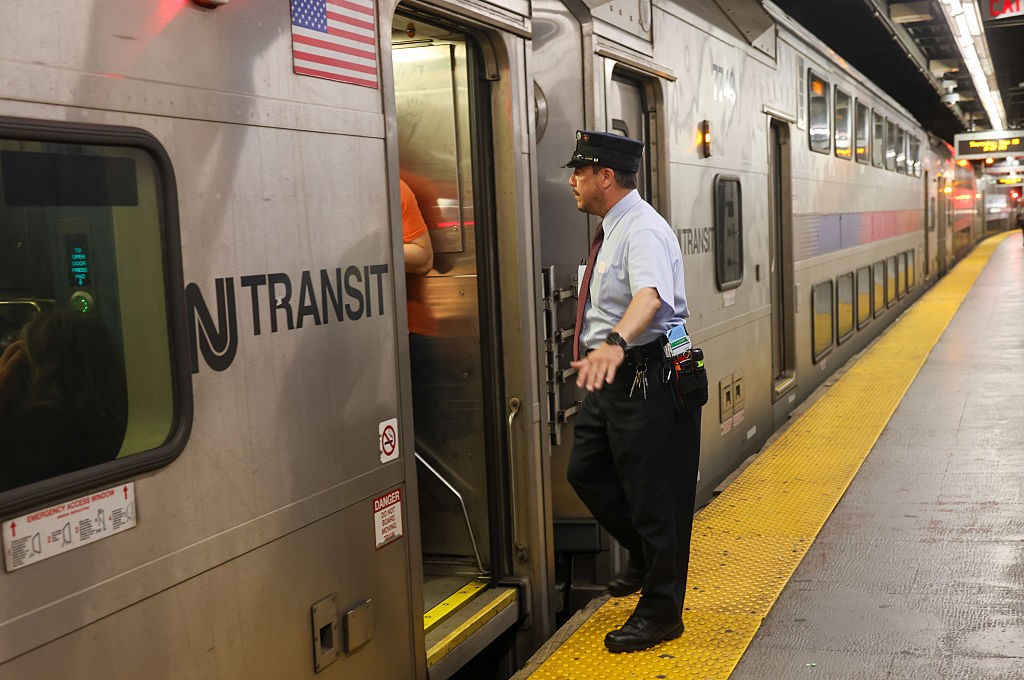NEW YORK, NEW YORK – MAY 15: A train conductor stands on the platform as people board a New Jersey (NJ) Transit train in Manhattan on May 15, 2025 in New York City. Talks resumed on Thursday between NJ Transit and its rail engineers’ union in an attempt to reach an agreement to avert a walkout by the union scheduled for early Friday. NJ Transit is the nation’s third-largest transit system; it operates buses and rail in the state, which serve nearly 1 million weekday trips. (Photo by Spencer Platt/Getty Images)
Locomotive engineers at NJ Transit launched a strike early Friday morning that will stall rail service across the state as contract negotiations that have worn on for more than five years remain stalled over a wage dispute.
The strike will completely stop the agency’s rail service, including Metro-North Railroad lines west of the Hudson River, from 12:01 a.m. Friday, and union members will form picket lines across the system later Friday.
Gov. Phil Murphy and NJ Transit CEO Kris Kolluri pinned the blame for the strike on the union, saying the Brotherhood of Locomotive Engineers and Trainmen asked for salary increases that would force NJ Transit to give similar pay hikes to all of its other unions and bankrupt the agency. Union officials, meanwhile, said NJ Transit has allowed the engineers’ wages to fall well below what engineers for other railroads are paid.
“NJ Transit just remains unwilling to bridge that gap,” said Tom Haas, general chairman for the NJ Transit engineers union.
The last NJ Transit work stoppage occurred in 1983 and lasted 34 days.
NJ Transit’s contingency plan for the strike includes shuttle service to the Port Authority Bus Terminal or to PATH stations in Newark and Harrison in the morning, with return trips in the afternoon and early evening, along with increased bus service to large stations. Amtrak trains will continue to run on the northeast corridor.
The agency has said the plan, forecast to cost about $4 million per day, could offer transit to roughly 20% of NJ Transit rail customers.
“For the rest of them, we’re going to ask for your patience, and if you’re able to work from home, we really would ask you to do that,” Kolluri said at a press conference late Thursday at Newark Penn Station.
Haas said NJ Transit walked away from the negotiation table two hours before the Thursday 11:59 p.m. deadline to reach a deal (the Newark Penn Station press conference was called for 10:30 p.m.).
“We presented them the last proposal, they rejected it and walked away with two hours left on the clock,” he said.
Kolluri said approving the union’s proposal would trigger what’s known as a “me too” clause in NJ Transit’s contracts with its other unions, forcing the agency to award all of its unionized employees the same pay hikes granted to the engineers. Murphy said Thursday that would cost the agency $100 million or more.
Haas disputed that, saying the union’s proposal calls for cost savings in other areas that would allow NJ Transit to avoid honoring the “me too” clause in the other contracts.
Kolluri said recent talks had been productive and appeared to indicate a resolution could come soon.
“I’m going to suggest to you that this is not a lost cause. This is an imminently achievable deal,” Kolluri said.
The agency has offered pattern wage increases that align with those awarded to its 14 other unions. Those increases would raise engineers’ salaries by 23% over eight compounding increases ranging between 2% and 3% across seven years.
The union has sought increases that are two percentage points larger and would result in a 43.5% wage increase over the seven-year term. They’ve also sought three additional years of 5% raises that would bring the overall increase to about 66.2%.
Negotiations between the two parties spilled into public acrimony last week, but the two sides moderated their public campaigns as negotiations entered their final days this week. Both sides signaled a willingness to return to the bargaining table.
“If they’re willing to meet tonight, I’ll meet them again tonight. If they want to meet tomorrow morning, I’ll do it again because I think this is an imminently workable problem,” Kolluri said. “The question is, do they have the willingness to come to a solution.”
The National Mediation Board, a federal body that oversaw the dispute for years at an earlier stage, invited the two sides to negotiate on Sunday, agency and union officials said.
“Any time that they have a proposal to bring to us that addresses the wage inequality that New Jersey Transit locomotive engineers face, we’ll be more than happy to sit down and talk with them for as long as it takes to reach a deal,” Haas said.
A shortage of locomotive engineers was a major source of train cancellations and delays earlier in Murphy’s tenure, though such cancellations fell precipitously as agency staffing improved.
Federal law prescribes strict processes for rail worker strikes, and Congress and President Donald Trump could still move to avert a strike by passing and signing legislation to impose a contract on locomotive engineers, as President Joe Biden did in late 2022, though neither Congress nor Trump have indicated they will intervene.
SUBSCRIBE: GET THE MORNING HEADLINES DELIVERED TO YOUR INBOX
Read the full article here


